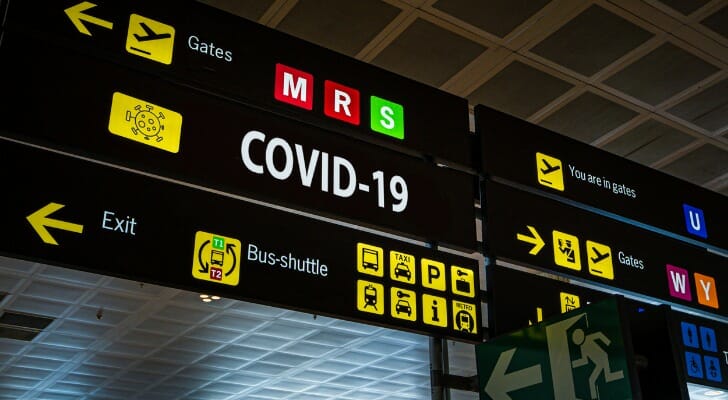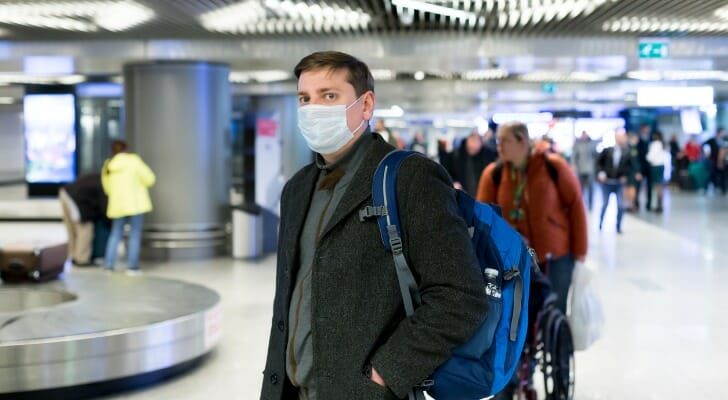Since the coronavirus pandemic went global in early 2020, travel and tourism have been heavily impacted. Millions of people have seen their trips canceled by airlines and tour companies, with millions more choosing to cancel their trips out of caution and fear. Those who still need to travel for essential reasons are forced to take extreme precautions. So while most people are opting out of traveling for the time being, let’s take a look at what you should know about traveling during the time of coronavirus.
Your travel plans won’t be the only thing that changes during this time. To make sure you’re prepared for the future, talk to a financial advisor today.
Travel Bans, Restrictions and Advisories
Travel around the U.S. and the world at large has virtually ground to a halt thanks to the coronavirus crisis. Much of this is due to global travel advisories and restrictions issued by countries around the world. The U.S. federal government itself has issued several advisories over the last few months.
The government first banned travelers from China and Europe from entering the country, which caused travel volumes to plummet even further. Since then, other countries have instituted policies that are designed to limit the influx of travelers and, in turn, the spread of COVID-19. Many countries also require travelers to quarantine for around two weeks upon entry, so it’s not easy to just disregard travel advisories and continue on with a planned vacation.
Traveling internationally is difficult to pull off these days due to travel restrictions and mass flight cancellations. Many airlines have even suspended their operations entirely or are just flying a small handful of routes.
Domestic travel, on the other hand, is still allowed in the U.S. While the government has asked that residents of certain states only travel for essential reasons, it’s largely up to each individual to determine what constitutes an “essential reason.” However, airlines have also scaled their domestic operations way back as a result of the crisis, so it may be difficult to find flights.
Canceling Travel

Due to the coronavirus pandemic, many travelers have canceled their trips or put them on hold until the crisis is over. Those who have travel insurance, either through an insurance company or through a credit card, are often finding that canceling a trip out of concern for the coronavirus pandemic is generally not a covered reason. Chase has even stated that mandatory quarantine is not a valid reason to make a claim on their credit card travel insurance.
If you fall into this category, don’t panic. You don’t necessarily need to take advantage of travel insurance if you’re interested in canceling a trip. Many airlines, hotel chains and other tourism companies are offering to fully refund the cost of tickets, bookings and expenses without needing to get travel insurance involved.
When it comes to airlines, hotels and cruises, you may be offered a voucher for future use, or you’ll likely have the option to request a cash refund. Individual tourism companies, such as safaris or tours, may only give you the option to reschedule. In any case, it makes sense to contact the company to see what your options are, with travel insurance serving as a last resort.
It’s important to note that most travel insurance will cover you if you actually contract COVID-19 and can’t travel as a result. Your full list of covered reasons to cancel travel insurance will depend on the specific policy you purchased, though.
How to Travel Safely
Not everyone is going to be able to heed the shelter in place orders given around the country, as certain individuals need to fly for work or perhaps need to travel to care for family members. If you’re able to avoid mass transit, like buses, airlines or trains, it’s best to do so. But if you need to, traveling with other people doesn’t necessarily mean you’ll become infected.
Many airlines have taken it upon themselves to block off all middle seats so that passengers aren’t sitting near one another. Surfaces are also cleaned regularly to help curb the spread of the virus on a mass transit vehicle. However, it’s important to remember that most people aren’t traveling right now, so your flight is likely to be fairly empty, making social distancing even easier.
If you decide to take mass transit during the coronavirus pandemic, there are additional steps you can take to keep yourself safe, similar to how you’d protect yourself at the grocery store or the bank. The CDC recommends that you wear a cloth face covering or mask when in public settings. You should also bring disinfectant wipes to clean any surfaces you might touch, as well as gloves.
Bottom Line

The travel industry has been upended as a result of the coronavirus pandemic. As countries restrict travelers and airlines cancel flights, there can be a lot of confusion when it comes to travel. If you need to cancel a trip, there are plenty of options you have at your disposal. For those that still need to travel, there are always precautions you can take.
In addition, this could be a particularly great time to plan future trips, as costs are low and availability is abundant. However, no matter what you do, make sure you stay informed and up to date on the latest information.
Tips for Managing Your Finances During Coronavirus
- A financial advisor can help you build a financial plan that sustains you in times of economic uncertainty. Finding a financial advisor in your area doesn’t have to be hard, as SmartAsset’s free tool can match you with up to three advisors near you. If you’re ready to get connected to local advisors, get started now.
- If you have credit card debt and are worried about being able to pay your balances, you’re not alone. Check out SmartAsset’s guide to protecting your credit score during the coronavirus crisis.
Photo credit: ©iStock.com/Rawf8, ©iStock.com/Tanaonte, ©iStock.com/Irina Velichkina
